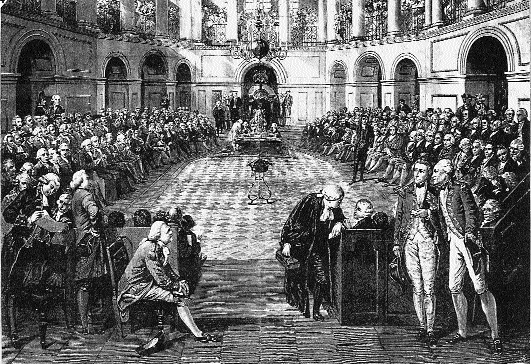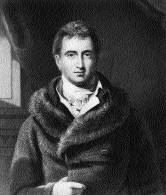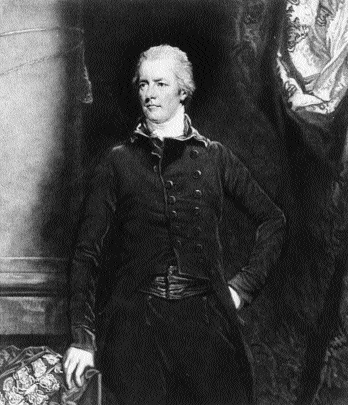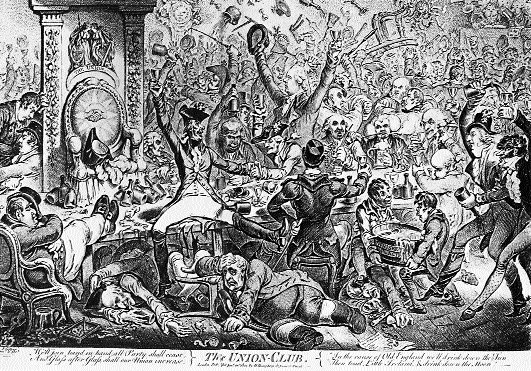“An Act of Power & Corruption”?
Published in 18th–19th - Century History, Features, Issue 2 (Summer 2000), The Act of Union, Volume 8
The Great Parliament of Ireland, 1790 by Henry Barraud and John Hayter. (Campbell College, Belfast)
The object of the disaffected in Ireland is the repeal of the Act of Union.
(Report of Sir Arthur Wellesey’s
agent, May 1808)
The passing of the Act of Union (1800) was one of the most controversial and contested events in modern Irish history. The historiography has reflected this with interpretations divided on key elements of how and why it was achieved, and at what cost. Lacking in the doomed heroism of the 1798 Rebellion, or the other requisite ingredients essential for any popular commemoration, its bicentenary this year has largely gone unnoticed. Nevertheless the Union remains one of the most divisive and defining moments of modern Irish political history. Even today, the mere mention of the Act evokes strong feelings in Ireland, and it remains a visible and potent symbol of some of the continuing problems on the island. In many ways the history of the past two hundred has been dominated by the measure, and the various responses and reactions to it.
‘An act of power and corruption’: the historiography of the Union
For many the key debate about the Union has always concerned how it was passed. Opponents of the measure at the time were quick to provide their own interpretation, one which was generally accepted by nationalists in the nineteenth century. The allegation was that the Union passed in ‘an orgy of corruption’; the argument was that it was an unpopular measure forced through an unwilling parliament, and a hostile country, by the power and money of the British government. This exposition was best developed by Jonah Barrington, in his various memoirs, and Henry Grattan jnr., in his life of his father, and finally culminated in the poem that was soon taught in every school in Ireland:
How did they pass the Union?
By perjury and fraud;
By slaves who sold their land for gold,
As Judas sold his God.
Few disputed the younger Grattan’s assertion that the Union had passed illegally, and that it was ‘an act of power and corruption’. While judicious historians like W.E.H. Lecky denied the more extravagant claims, such as the allegation that secret service money had been used, there remained a consensus that the Irish parliament had been infected, and fatally undermined, by what Lecky termed ‘a virus of corruption’. One of the first full accounts of the measure, A history of the legislative union of Great Britain and Ireland (1887) by T.D. Ingram, attempted clumsily to ignore these charges, and was ignored in turn.
The corruption thesis went largely unchallenged in the twentieth century until 1966 when G.C. Bolton published his classic study The passing of the Irish act of union. Bolton contested the existing orthodoxy by returning to first principles, and examining the various primary sources. What he felt obliged to conclude was that bribery, if it did occur, was only a very minor part of the narrative and that the key issues of borough compensation, patronage, and the Catholic question were far more decisive. The publication by John Gilbert of Documents relating to Ireland 1795-1804 four years later strengthened this thesis. Gilbert included the full secret service accounts for the period, proving it seemed, once and for all, that money could not have been used illegally from that source. The anti-corruption argument of Bolton proved convincing, and helped explain how certain practices, such as patronage, that might now seem unethical, were perfectly acceptable by the standards of the late-eighteenth century. The new orthodoxy held that the Union was an act of skilful management, and that while its passing might have challenged the boundaries of what was legal, it never actually crossed them.
The neo-corruption argument
The past twenty years has seen the unearthing of a wealth of new archival material that has transformed previous interpretations about British activities in the 1790s. The majority of these papers have concerned foreign policy, revealing the existence of a fully efficient intelligence organisation on the Continent that was, even then, being referred to in official documents as ‘His majesty’s secret service’. This revolution in historical evidence has also applied to Ireland with the discovery of secret service papers that were previously ‘missing’. Now on display in the Public Record Office, Kew, the documents reveal the existence of covert secret service activity in Ireland during the passing of the Union. In effect they constitute a second, secret set of secret service accounts, that were kept separate and distinct from the normal money that was accounted for legally, and which was catalogued in Gilbert. How these files went missing for almost two hundred years has never been adequately explained. What is clear is that a major cover-up was initiated after the passing of the Union to prevent any exposure of the illegal methods that had been approved. Documents and receipts were destroyed, fictitious accounts were approved, and the silence of those complicit in the activities was secured one way or another.

Viscount Castlereagh-referred to the special funds as ‘the means by which so much depends’. (Linen Hall Library, Belfast)
This paralleled directly the secret service money that was used on the Continent for espionage and counter-revolutionary activity. Technically the money was regulated and limited by various acts of parliament; in reality the legislation was wilfully ignored, and expenditure in the period made a mockery of the legal safeguards. According to Burke’s civil list act (1782) for Britain, secret service expenditure had to remain within certain limits determined by parliament, usually £100,000.* Ireland was governed by its own civil list act (1793) which suggested a figure of £5,000 for money used annually ‘for detecting or preventing treasonable conspiracies’. In both domestic and foreign policy affairs these limits were ignored. A good example of the range of expenditure is that approximately £3,500 of secret service money was channelled into the conspiracy which culminated in the assassination of Tsar Paul I of Russia in 1801, while William Wickham’s ‘secret account’ for funding counter-revolutionary activity on the Continent came to £3,682,520 for the first six months of 1800. It is in this context of European activity that the money sent to Ireland to assist the Union should be evaluated. In total the money came to £30,850, a significant but not a spectacular sum and the neo-corruption argument has concentrated largely on the possible use, or misuse, of this money. The chief secretary, Viscount Castlereagh, called the different sums ‘the means by which so much depends’, and one thing is certain about their purpose: the money was used for the creation of a covert slush fund, that could be used to respond to any exigency, and answer any emergency.
The ‘three Cs’
The Union that was passed successfully in 1800 was substantially different, in tone and content, from the one that had been embarrassingly rejected the previous year. For one thing its structure was significantly reworked, with the idea of appointing commissioners to negotiate it along the lines of the Scottish union of 1707 abandoned. While corruption, patronage and intimidation had not been lacking in January 1799, the Castle, taking its lead from London, had been reluctant to countenance expensive gestures, and costly interventions were largely ignored. The greatest expenditure of all was not accepted: borough compensation. The parliamentary seats that were regarded as property were not to be treated as such, and proprietors were not to be compensated for their abolition, diminishing the attractiveness of the Union in the eyes of many owners. Catholics were also kept at arms length from the measure, with the government abandoning initial interest in Emancipation to appease the more powerful Protestant interests.
Forced to regroup and re-examine their options after their parliamentary defeat, the Castle took key decisions in 1799 that altered drastically the style and structure of the Union. The most important of these was the enthusiastic adoption of the ‘three Cs’ to secure victory: compensation, Catholic Emancipation and corruption. The union debate has largely centred on the final of these areas, but a strong case can be made for the significance of the first two. The figure for borough compensation was estimated in February 1799 at approximately one and a quarter million pounds, a total that provides another useful context for evaluating the secret service money. Hesitant MPs, like Edmund Burke’s correspondent Sir Hercules Langrishe, received substantial compensation for the loss of their seats making the Union easier to contemplate. Although vigorous opponents of the measure, like the Marquess of Downshire, also received money for the abolition of their seats, because borough compensation had not been on offer in 1799 it soon became viewed as part of the general corruption on display. The new Catholic component of the Union scheme was kept more discreet. In November 1799 the cabinet in London informed the visiting Castlereagh that the lord lieutenant was authorised to promise Emancipation if the fate of the Union hung on the support of the Catholics. The viceroy, Cornwallis, had been a highly effective spin-doctor on behalf of the Catholics, and had made it clear that while their support could not ensure victory, their opposition would guarantee defeat. This was probably the case, and as the cabinet were terrified of seeing the Union rejected a second time they conceded the point. While theoretically the government could attempt the Union annually until it passed, in real terms they knew they had only one more chance. Perennial defeats would only reinforce the arguments of the opposition, and demonstrate that the ministry was determined to pass the measure whatever the wishes of the commons or the country.
The Union slush fund
Having secured the acquiescence, or at least neutrality, of the Catholic masses, and after having removed the most potent grievance of the proprietors, all that remained was to win friends for the measure and influence members. This is where the secret slush fund came into operation, keeping recalcitrant individuals content until an official, and legal, pension, could be secured for them by the granting of an office or sinecure. The fund was also to be used for the propaganda war, paying printers’ bills, employing polemicists, and possibly even buying up opposition pamphlets so that they could be destroyed.
The money was paid in five instalments: £850 in October 1799, £10,000 in January 1800, £10,000 in February, £5,000 in April and a further £5,000 in May. When the commons resumed in January 1800 the Castle were confident in the strength of their numbers, and the divisions over the following months would reveal that they were correct in their assumptions. However the administration refused to become complacent, recognising that the real work was now keeping their supporters happy and preserving their majority. This was not an easy task, and required every inducement and incentive available, and if necessary the use of intimidation. Patronage, as Bolton so ably explains, was crucial, from the promise of peerages at the highest level to pensions and places at the lowest. This, of course, was part of the normal parliamentary traffic of the country, and although the Castle echoed Lord Harcourt’s doomed administration in its liberality, it did not cross the line into illegality. Offering official rewards to government supporters was nothing new, and, although sometimes criticised, it was generally accepted as an integral part of the political game. Hard cash, on the other hand, was not.

William Pitt-when King George III recovered from illness in March 1801 Pitt had to persuade the king that he had indeed authorised covert funds. (National Gallery of Ireland)
The Alien Office
Directing the transfer of funds from London was John King, ostensibly an under-secretary at the Home Office, but in reality the head of the Alien Office, a shadowy sub-department that ran ‘His majesty’s secret service’ on the Continent. It was King who liaised with Castlereagh, and who was always on hand whenever the Castle lost confidence. On 27 February 1800 the chief secretary admitted that there was little chance of converting opposition members as they were ‘steady to each other’. But significantly, he revealed that if the slush fund went dry their support would haemorrhage. Even a few defections could be disastrous. The message was blunt:
we require your assistance and you must be prepared to enable us to fulfil the expectations which it was impossible to avoid creating at the moment of difficulty. You may be sure we have rather erred on the side of moderation.
The demands became more immoderate as the Union debates continued. With rumours of a similar opposition fund reaching £100,000 there was great unease as every resource of the administration was strained to breaking point. The requests became more frequent and more forceful, with Edward Cooke, the castle under-secretary for the civil department, informing King that further money was ‘absolutely essential for our demands increase’. After every transaction Castlereagh sent a receipt for the money, promising to be ‘fully accountable’. These receipts were kept separate from the other secret service accounts, with their existence known to only a handful.
Defeat from victory? The threat of exposure
The passing of the Union in June 1800 did not mark the end of the Castle’s campaign; in many ways the following months proved more difficult as the ministers struggled to meet their pledges. Various financial debts had also accrued that needed acting upon, and further secret service money from England was not forthcoming. With the existing slush fund already exhausted, an ingenious method was hit upon to raise additional finance. The Castle discovered that a saving of £18,000 had been made on the Irish civil list in 1800. Instead of sending this money to the king, as required by law, Castlereagh received direct authorisation from London to channel the money into paying supporters of the Union. This unorthodox procedure was sanctioned by the prime minister Pitt, the home secretary, Portland, and even received the approval of King George III himself. In effect they were enabling the Castle to embezzle the necessary funds, to be replaced at a future, unspecified date. What this £18,000 was used for is not clear. Certainly the Castle had purchased seats that had fallen vacant, and had encouraged sympathetic figures to do the same, so these debts needed to be met. The propaganda war had also been won at a price, with printers now demanding that their debts be discharged. The Castle’s unease about these claims is significant. With the spectre of exposure hanging over them, they were not prepared to risk their own reputations, and that of the Union, while victory was still being celebrated.
![A contemporary anti-Union cartoon. The town crier to the left shouts: ‘Hearye! Hearye! Wanted immediately, a few Hundred persons of any Description to sign for a Union. 2s. 2p. a head for those who can write. 1s. 1p. for those who can Scratch their mark-God save the King & his Majesty's subjects of west Britain that is to be-!!!'. The figure fifth from the right says: ‘I, my Lord Marquiss Chief Steward [Castlereagh], am anxious to collect the sense of such respectable persons!'. (Linen Hall Library, Belfast)](/wp-content/uploads/2013/02/An-Act-of-Power-Corruption-4.jpg)
A contemporary anti-Union cartoon. The town crier to the left shouts: ‘Hearye! Hearye! Wanted immediately, a few Hundred persons of any Description to sign for a Union. 2s. 2p. a head for those who can write. 1s. 1p. for those who can Scratch their mark-God save the King & his Majesty’s subjects of west Britain that is to be-!!!’. The figure fifth from the right says: ‘I, my Lord Marquiss Chief Steward [Castlereagh], am anxious to collect the sense of such respectable persons!’. (Linen Hall Library, Belfast)
The change of administration in Ireland led to a shift in the political dynamic. With Cornwallis and Castlereagh gone, the only remaining figure who was aware of what had been done to secure the Union was Edward Cooke. Indeed it was for this reason, and no other, that Castlereagh had begged him not to resign with everyone else. The new viceroy, Hardwicke, however, was not briefed before he came to Ireland, and for a time suspected Cooke of having been involved in embezzlement. Mortified, Cooke reacted with genuine anger, and Hardwicke was forced to apologise. Nevertheless much bad feeling was created, and Cooke became an increasingly peripheral figure in the new Castle administration. His only real responsibility was fulfilling the Union promises, and to this end he wrote to John King at the Alien Office in October 1801 requesting £14,800 to meet pressing debts. Insisting that delay was ‘dangerous and discreditable’, his nervousness underlines the seriousness of what was at stake. In the end, the secret service fund could only supply a small sum, but the fact that £14,800 had already been spent on the Union campaign, and needed to be met, means that this figure should also be included in the total for Union corruption.

A pro-Union cartoon by Gillray celebrating ‘the Union Club’-‘We’ll join hand in hand, all Party shall cease/And Glass after Glass, shall our Union increase/In the cause of Old England we’ll drink down the Sun/Then toast Little Ireland & drink down the Sun!’. (Photo Mansell
The new Union debate about corruption has almost exclusively concentrated on the secret service funds of £30,850. It is clear, however, that the £18,000 from the civil list and the £14,800 from autumn 1801 should also be added, making a final total of £63,650. Even this figure might not represent the complete amount, as money may have been channelled from other sources to help finance the covert Union campaign, and for which the details have never surfaced. For example, the misuse of Irish civil list money is only known because of the subsequent collapse of the ministry. In the cover-up which took place after the Union, almost all the evidence was destroyed that could allow the secret details of the transactions to be revealed. However the documents that did survive allow for a reconstruction of some of the secret Union dealings, as well as for speculation about other possible activities of the Castle. And the fact that Irish MPs were still terrified in 1804 about their actions being revealed provides further evidence of the magnitude of the corrupt dealings that had taken place in Ireland 1799-1801.
How they passed the union
Undermined by the twin engines of patronage and intimidation, the defence of the Irish parliament crumbled in the first half of 1800. As the stalwarts of the opposition had been unwilling to enlist the support of Catholics, their attempts to raise a clamour outside of parliament foundered when they discovered the Castle’s manoeuvres in that quarter had left them bereft of possible allies. Demoralised but defiant, the steadfast opponents of the Union debated to the end but the outcome was never in doubt. Why their opposition failed can not be attributed to any single reason. Many factors were at work, and much recent debate has centred on whether the Union was genuinely unpopular in the country. But, ultimately, everything was decided by the battle in parliament and there the anti-unionists proved ill-equipped and incapable of combating the various weapons and tactics of the Castle. Without doubt the most interesting element of the new Union debate is the recently discovered secret service papers. But the slush fund only assisted the government’s campaign, and the key elements remained patronage, the Catholic question, borough compensation, but also the many valid and genuine arguments made in favour of union. Coming after the 1798 Rebellion had discredited the Irish parliament in many eyes, these factors combined to reveal that the Irish polity was on its last legs in 1800: the cancer of corruption ensured that the illness was terminal.
Patrick M. Geoghegan works on the Royal Irish Academy’s Dictionary of Irish Biography project and lectures in history at Trinity College, Dublin.
Further reading:
G.C. Bolton, The passing of the Irish Act of Union (London 1966).
P.M. Geoghegan, The Irish Act of Union (Dublin 1999).
E. Sparrow, Secret service: British agents in France, 1792-1815 (Suffolk 1999).
D. Wilkinson, ‘How did they pass the union? Secret service expenditure in Ireland in History, 82, no. 266 (April 1997).
















